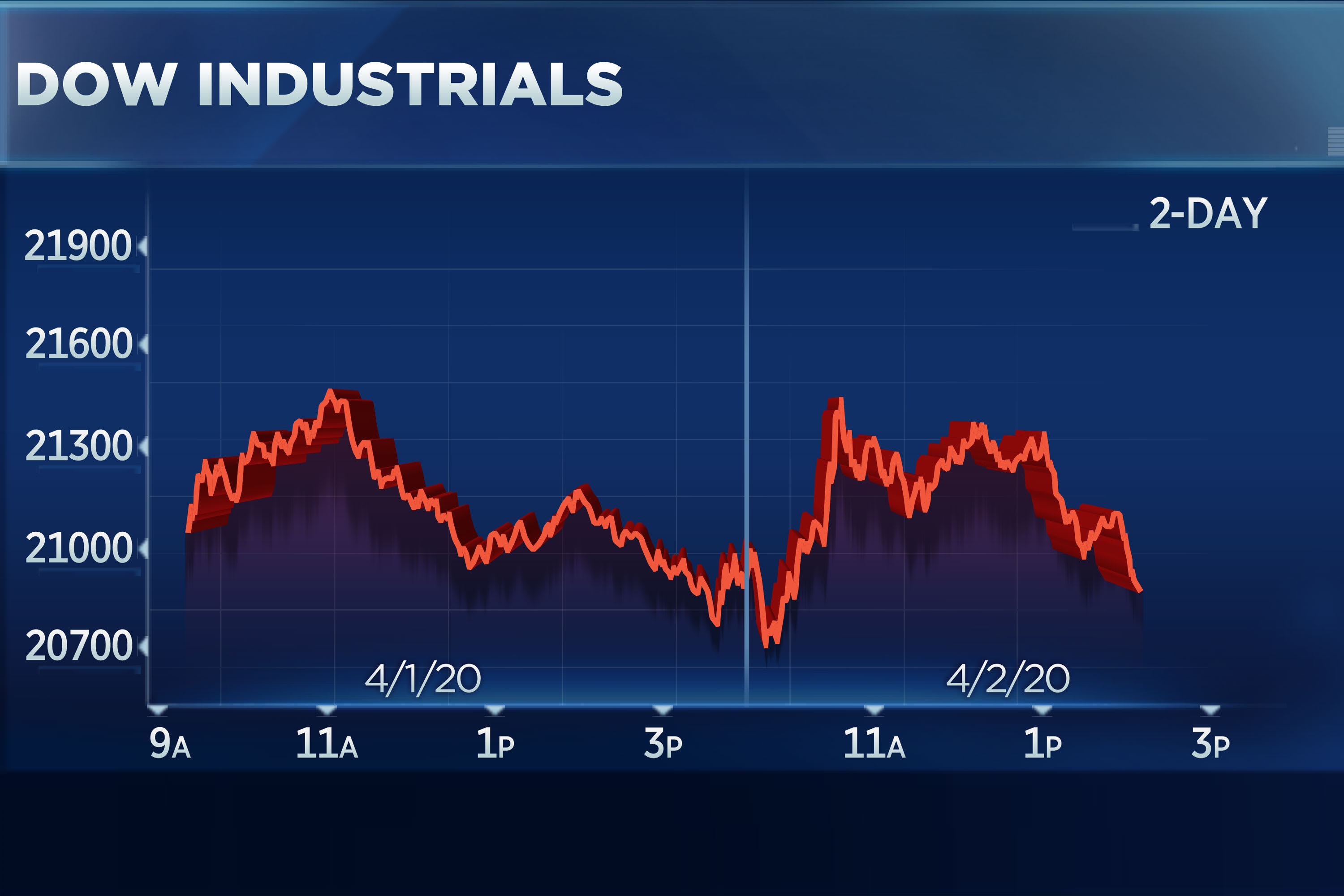
Stocks seesawed in Thursday trading after a record spike in U.S. unemployment claims fueled concerns over the coronavirus and its impact on the economy.
The Dow Jones Industrial Average traded 31 points lower, or 0.2%. The S&P 500 was up just 0.2% while the Nasdaq Composite dipped 0.2%. The major averages cut most of their gains in early afternoon trading. At its session high, the Dow was up 534 points, or more than 2%.
The Labor Department reported more than 6 million people filed for unemployment benefits in the week of March 27, a record. Economists expected another 4 million to 5 million workers filed for jobless claims last week as coronavirus-related shutdowns roll through the country. The estimates ranged as high as 9 million.
“The news is terrible and I’m not sure why the estimates the past two weeks have been so far off but we all know how rough things are,” said Peter Boockvar, chief investment officer at Bleakley Advisory Group. “The only question it seems is timing. The timing of when that freaking curve bends and when we as a society decide to shift to a life resumption plan, masks included.”
Earlier in the day, stocks rallied after President Donald Trump told CNBC’s Joe Kernen he spoke with Russian President Vladimir Putin and Saudi Crown Prince Mohammad Bin Salman, adding he expects both countries to cut production by about 10 million barrels. Those comments sent U.S. crude prices up more than 15%. There were, however, concerns that both countries would follow through on production cuts of that magnitude.
Trump later tweeted about his conversations with Putin and MBS.
Traders have been closely watching oil because of its influence over other financial markets. The oil losses have been so big, that they have caused investors to sell other assets to cover their losses in crude. Plus, the 63% decline in oil this year is hurting the U.S. shale industry, a big driver of the economy and employment.
Thursday’s moves come after the market suffered steep losses in the previous session. The major averages all fell more than 4% on Wednesday, pressured by comments from Trump, who said the U.S. should prepare for a “very, very painful two weeks.” White House officials are projecting between 100,000 and 240,000 virus deaths in the U.S.
New York Gov. Andrew Cuomo also said Wednesday the state’s model projects a high death rate through July.
“The [S&P 500] wasted no time proving that a new month and quarter were not going to alter the volatility that we grew so accustomed to recently,” said Frank Cappelleri, executive director at Instinet.
The coronavirus outbreak, which sent global markets tumbling in the first quarter, continues to act as a headwind for the market as investors grapple with the ongoing uncertainty around how long the economy will be closed.
The major stock averages are all down more than 20% year to date and are deep in bear market territory.
“While we have not seen announcements yet, dividend cuts could be on the horizon for U.S. companies,” said New York Life Investments multi-asset portfolio strategist Lauren Goodwin.
“With a heavy hit to revenues, businesses may opt to prioritize employees and lower borrowing loads over paying dividends. This could present a risk for equities. Announcements of temporary (1-2 quarters) of dividend cuts could be priced in, but longer cuts would likely contribute to negative sentiment,” she added.
More than 950,000 coronavirus cases have been confirmed globally, with over 216,000 in the U.S. alone, according to data from Johns Hopkins University.
Boston Federal Reserve President Eric Rosengren said Wednesday that Congress likely will have to deliver more stimulus to help those at the lower end of the economic spectrum and to boost small business.
Unemployment is likely to “rise pretty dramatically over the next couple of months” and the economic damage won’t abate until the coronavirus is brought under control, he said. “I don’t think we’ll turn a corner until people feel comfortable taking mass transit again,” he said.
—CNBC’s Jeff Cox and Nate Rattner contributed reporting.
Subscribe to CNBC PRO for exclusive insights and analysis, and live business day programming from around the world.

